Funds Europe puts questions to senior executives about M&A, fund management priorities and Brexit. Plus, essential figures about some of Europe’s largest administration providers.
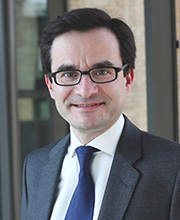 ARNAUD CLAUDON, HEAD OF ASSET OWNERS AND ASSET MANAGERS CLIENT LINES, BNP PARIBAS SECURITIES SERVICES
ARNAUD CLAUDON, HEAD OF ASSET OWNERS AND ASSET MANAGERS CLIENT LINES, BNP PARIBAS SECURITIES SERVICESHave you made any acquisition in the past two to three years and what were the drivers?
In 2018, we acquired Janus Henderson Investors’ middle and back-office operations in the US, making us one of the top-ten fund administrators in the US. In 2019, we took a minority stake in the capital of fintech AssetMetrix to expand and digitalise our services to private capital clients and investors. In 2020, we lifted out BlackRock’s back-office operations in Mexico, securing a 22% market share and a perfect position to pursue our growth.
Our global fund business now covers all major markets in the world, vehicle types and asset classes, enabling us to accompany our clients wherever they do business.
What ramifications have you seen in the wake of the Woodford fund collapse and the role of the fund administrator?
We see a growing trend in supporting asset managers’ boards, managers and compliance officers with an ever-wider scope and more detailed drill-down of data to closely monitor their funds.
Whether through acquisition or organic development, where is the most resource focused at present in the development of your business?
We employ more resources on organic growth, given the large scope and complexity of our business.
In your view, what should be the top one or two operational priorities for fund management firms now, and why?
With cost pressure expected to remain high, asset managers should look to harmonise their operating model and reassess outsourcing opportunities, consolidating providers across markets and products where appropriate.
Have you seen any notable shifts in appetite for clients launching product in particular domiciles in the past, say, two years and what were the drivers? Also, have you won any new mandates over the past year and where is new business coming from?
Generally speaking, our asset manager clients are looking to rationalise their offering, reducing the number of fund domiciles and fund structures on offer in order to manage costs and product complexity. The domiciles of choice remain Luxembourg and Ireland and these are being reinforced.
We are also seeing increasing interest in APAC, most notably in China to tap into the growing investor base in the country. It’s never been easier to distribute into China and both traditional and alternative asset managers are waking up to these opportunities.
In the context of Brexit, what are you finding to be the biggest challenges to fund clients (whether UK or European) and how are you helping them?
Fund clients need to carefully assess the location of their investor base and adjust their UK offering to their UK-based investors. For EU-based asset managers with EU fund ranges, this may in some cases result in the creation of a UK-specific fund range for UK investors, and vice versa. As a truly global firm, we are offering our clients services in nearly 20 jurisdictions, including the UK, Ireland and Luxembourg and can accommodate all solutions that help asset managers develop their competitive edge.
BNP Paribas Securities Services
9 rue du Débarcadère
93500, Pantin, France
+33 (0)1 42 98 10 00
www.securities.bnpparibas.com
Country of origin: France
Global number of employees: 1,200+
Total AuA: $2,817 billion
Total AuA in Emea business: $2,123 billion
Total AuA Ucits in Europe: n/d
Total AuA Non-Ucits in Europe: n/d
Senior executives in Europe: Patrick Colle (Paris/London), general manager; Arnaud Claudon; Paris, head of asset owner and asset managers client lines; Alexandre Pirlet (Luxembourg), head of fund administration, investment accounting and distribution solutions; Martin Bock (Luxembourg), head of global fund administration product
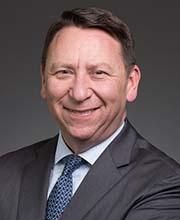 DARON PEARCE, CHIEF EXECUTIVE EMEA ASSET SERVICING BNY MELLON
DARON PEARCE, CHIEF EXECUTIVE EMEA ASSET SERVICING BNY MELLON
Have you made any acquisition in the past two to three years and what were the drivers?
No.
Whether through acquisition or organic development, where is the most resource focused at present in the development of your business?
Our focus is on digitising our core offerings in order to provide clients access to their data in more innovative, real-time, efficient ways – delivering intraday insights and more real-time transparency. We are launching next-generation data and analytics capabilities to help clients with their most complex data needs and challenges, and to capitalise on new data-driven opportunities. Our growing array of partnerships and collaborations has accelerated our ability to deliver modular solutions through an open-architecture model that offers clients optionality and choice. Examples include front-to-back integration of data and workflows, improving operational efficiencies, enhancing risk analytics solutions, and increased NAV [net asset value oversight.
In your view, what should be the top one or two operational priorities for fund management firms now, and why?
Our clients are increasingly focusing on their core competencies. They are searching for efficiencies and ways to improve their operating models that add value and are sustainable. With their fees under pressure, they look to reduce costs by passing some of that pressure on to their providers. This is an opportunity for us to show how we can bring extra value – supporting clients with solutions that make them more efficient and effective.
BNY Mellon
One Canada Square
Canary Wharf
London E14 5AL, UK
+44 20 7570 1784
www.bnymellon.com
Country of origin: USA
Global number of employees: n/d
Total AuA: $37,100 billion
Total AuA in Emea business: $1,604 billion
Total AuA Ucits in Europe: $1,044 billion
Total AuA Non-Ucits in Europe: $560 billion
Senior executives in Europe: Hani Kablawi (London), head of international and chairman, Emea; Daron Pearce (London), CEO Emea asset servicing; Katherine Starks (Frankfurt), head of asset servicing, Germany, Austria, Switzerland and CEE region
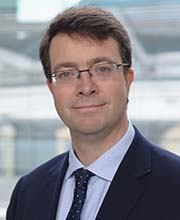 NEIL COXHEAD, MANAGING DIRECTOR, UK BRANCH AND HEAD OF REGIONAL COVERAGE – IRELAND, NORTH AMERICA AND UK, CACEIS
NEIL COXHEAD, MANAGING DIRECTOR, UK BRANCH AND HEAD OF REGIONAL COVERAGE – IRELAND, NORTH AMERICA AND UK, CACEIS
Have you made any acquisition in the past two to three years and what were the drivers?
In 2019, we acquired the Dutch asset servicer KAS Bank to deepen our experience in pension fund services and to increase our market share in the Netherlands. We also formed a service partnership with S3, Santander’s securities services division, to develop our business in Spain and Latin America.
What ramifications have you seen in the wake of the Woodford fund collapse and the role of the fund administrator?
There has been a rise in the level of independent oversight along with a need to review the roles and responsibilities of fund governance practitioners. There has also been a specific focus on liquidity monitoring for open-end funds. The FCA’s [Financial Conduct Authority] review of hosted authorised corporate director (ACD) effectiveness and their related solvency may have further impacts when it concludes in June.
Whether through acquisition or organic development, where is the most resource focused at present in the development of your business?
Following the KAS Bank and S3 deals, resources are focused on exploiting operational synergies and rolling out the full Caceis service range to their clients.
In your view, what should be the top one or two operational priorities for fund management firms now, and why?
The current period of business continuity will focus firms’ attention on the practicalities of running operational activities in-house. Once things get back to normal, firms will assess their current models (including any offshoring) to confirm if they proved fit for purpose and then take action accordingly.
Have you seen any notable shifts in appetite for clients launching product in particular domiciles in the past, say, two years and what were the drivers? Also, have you won any new mandates over the past year and where is new business coming from?
Luxembourg is now the clear domicile of choice for UK managers seeking to launch private equity and real estate funds now that the local structures are comparable with what is on offer in the UK. We also note a continued trend in companies launching ETF products and a growing appetite for ETFs from our institutional investor clients (such as pension funds).
Our biggest recent mandate win was Candriam Asset Management in 2019. We expect significant new business to come from the Santander network locations (southern Europe and South America) as our joint financial strength, geographic coverage and product scope strengthen our sales pitch to leading investment companies.
In the context of Brexit, what are you finding to be the biggest challenges to fund clients (whether UK or European) and how are you helping them?
The trend for our UK managers setting up Luxembourg or Irish-domiciled products for EU market distribution continues. Some EU clients are also interested in launching UK-domiciled products for their UK investors. Our UK branch can help such clients launch new products depending on the final passporting rules. The newly announced UK Professional Investor Fund (PIF) also represents a new challenge and we are getting ready to support new client launches.
Caceis
1-3, place Valhubert
75206 Paris Cedex 13, France
[email protected]
+33 1 57 78 00 00
www.caceis.com
Country of origin: France
Global number of employees: 1,850
Total AuA: $2,298 billion
Total AuA in Emea business: $2,298 billion
Total AuA Ucits in Europe: $981 billion
Total AuA Non-Ucits in Europe: $1,317 billion
Senior executives in Europe: Jean-François Abadie (Paris), chief executive officer; Joe Saliba (Paris), deputy chief executive officer; Pierre Cimino (Luxembourg), head of international business development – member of the executive committee; Neil Coxhead (London), managing director, UK branch and head of regional coverage – Ireland, North America and UK
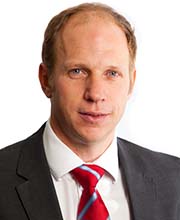 CARL ANDREWS, REGIONAL HEAD OF EUROPE, HSBC SECURITIES SERVICES
CARL ANDREWS, REGIONAL HEAD OF EUROPE, HSBC SECURITIES SERVICES
Have you made any acquisition in the past two to three years and what were the drivers?
No.
What ramifications have you seen in the wake of the Woodford fund collapse and the role of the fund administrator?
We have seen greater interest in transparency of the underlying investments within funds with an increased focus on pricing policies/sources and volumes of less liquid/hard-to-price assets within portfolios. We are also aware of greater scrutiny on the dealing frequency for open-ended funds investing in illiquid assets.
Whether through acquisition or organic development, where is the most resource focused at present in the development of your business?
We are seeing an increased focus from asset managers on investor experience, particularly through digital channels. Executed correctly, this can deliver a more personalised service, focused on and tailored to the investor’s specific needs. This supports the firm’s growth strategy and can accelerate product distribution. We are continuing to invest in our global TA [transfer agent] proposition, not merely digitising the current state, seeking to deliver an enhanced operating model, with digital solutions at the core. We have delivered a TA API [application program interface] suite and enabled client white-labelling of our investor portal, with a mobile version under development.
In your view, what should be the top one or two operational priorities for fund management firms now, and why?
Simplification and transparency – simplification of operational models and pooling of fund structures to maximise efficiency and investment returns. This will provide consistency of approach and greater transparency of reporting through to the end investor.
DOROTHY HAMILTON, GLOBAL HEAD OF FUND SERVICES OPERATIONS
Have you seen any notable shifts in appetite for clients launching product in particular domiciles in the past, say, two years and what were the drivers? Also have you won any new mandates over the past year and where is new business coming from?
Increase in demand for authorised contractual schemes. Appetite for these products is being driven by operational and cost efficiencies.
Significant product innovation in passive and smart beta strategies. This has been among the strongest growth areas with these strategies being created in both Ucits mutual funds and ETF [exchange-traded fund] wrappers. Appetite for indexing from investors is primarily driven by low cost, transparency and liquidity.
Launch of private asset-based strategies in the AIFMD [Alternative Investment Fund Managers Directive] format. Private debt and infrastructure-related strategies are especially popular. Clients are launching parallel European funds to attract European investors, mirroring pre-existing strategies previously established in US and/or Cayman/Bermudan funds. Appetite for these asset classes is primarily being return-driven and portfolio diversification.
In the context of Brexit, what are you finding to be the biggest challenges to fund clients (whether UK or European) and how are you helping them?
Uncertainty over regulation and potential tax implications from Brexit is leading to constant re-evaluation of the best approach for fund-structuring solutions. We are supporting clients through this by providing flexible, and yet consistent, solutions across different jurisdictions. This extends to the launch of double layers of tax-transparent funds across jurisdictions for taxable investors.
HSBC Securities Services
8 Canada Square
London E14 5HQ, UK
+ 44 20 7991 8888
www.hsbcnet.com/hss
Country of origin: UK
Global number of employees: 2,400
Total AuA: $3,966 billion
Total AuA in Emea business: $2,668 billion
Total AuA Ucits in Europe: $265 billion
Total AuA Non-Ucits in Europe: $520 billion
Senior executives in Europe: Allegra Berman (London), global co-head of HSBC Securities Services; Richard Godfrey (London) global co-head of HSBC Securities Services; Sebastien Danloy (London), global head of asset owners and managers sector; Carl Andrews (London), regional head of Europe
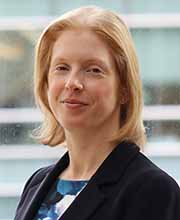 DIANE MACFARLANE, HEAD OF GLOBAL FUND SERVICES – EMEA, JP MORGAN
DIANE MACFARLANE, HEAD OF GLOBAL FUND SERVICES – EMEA, JP MORGAN
What ramifications have you seen in the wake of the Woodford fund collapse and the role of the fund administrator?
We have always worked closely with depositaries to provide information on both fund assets and inflow and outflow activity, and we have assisted with additional information demands as the focus on fund liquidity has increased.
We continue to see increasing use of our extensive independent asset pricing capabilities, which enables our clients, ACDs [authorised corporate directors] and depositaries to maximise impartiality in the valuation process.
Whether through acquisition or organic development, where is the most resource focused at present in the development of your business?
We are making high levels of technology investment in the development of our strategic operating model, where we continue to enhance our integrated data approach to maximise consistency and efficiency in our enterprise-wide architecture. Aligned to this is our investment across our client platforms, whether that be through enabling increased areas for automation in inbound data capture e.g. transfer agency or fund accounting instructions, as well as in the technology that our clients are end users of. These include technologies to enable our clients to efficiently monitor NAV or investor activity to meet increased regulatory oversight demands, or to provide additional information on portfolios such as ESG [environmental, social and governance] analytics helping our clients with provision of information to investors.
In your view, what should be the top one or two operational priorities for fund management firms now, and why?
Cost management and value for money continues to be a priority across the industry, and we would highlight the potential opportunities available from adoption of the standardised processes that use of third-party specialists such as JP Morgan can offer.
We also regularly hold roundtable forums with our asset manager clients in each of our main fund administration locations. Such focused communication events are a great way to identify operational opportunities and validate priorities for both our clients and us.
MARCEL GUIBOUT, FUND SERVICES PRODUCT STRATEGY LEAD
Have you seen any notable shifts in appetite for clients launching product in particular domiciles in the past, say, two years and what were the drivers? Also, have you won any new mandates over the past year and where is new business coming from?
Ireland and Luxembourg continue to see the majority of new Ucits fund launches. We’ve also seen clients launching new funds in the UK driven by Brexit.
We have won a number of significant new mandates over the past year, with clients switching from other providers or outsourcing administration activities previously undertaken in-house.
In the context of Brexit, what are you finding to be the biggest challenges to fund clients (whether UK or European) and how are you helping them?
We have continued to support client activities driven by Brexit, through both sharing of our experience and knowledge across the European market to help them on product development activities, as well as being able to support multiple fund launches in new markets they are domiciling funds into.
JP Morgan
25 Bank Street, London E14 5JP, UK
020 7742 4000
www.jpmorgan.com/country/GB/EN/solutions/cib/securities-services
Country of origin: USA
Global number of employees: 3,476
Total AuA: $11,386 billion
Total AuA in Emea business: $2,488 billion
Total AuA Ucits in Europe: $1,213 billion
Total AuA Non-Ucits in Europe: n/d
Senior executives in Europe: Diane MacFarlane (London), head of global fund services Emea; Chris Rowland (London), head of securities services Emea; Shaun Parkes (London), head of platform sales Emea
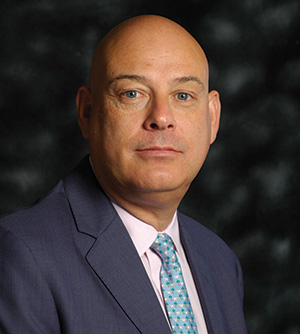 CLIVE BELLOWS, HEAD OF GLOBAL FUND SERVICES EMEA, NORTHERN TRUST
CLIVE BELLOWS, HEAD OF GLOBAL FUND SERVICES EMEA, NORTHERN TRUST
Have you made any acquisition in the past two to three years and what were the drivers?
In November 2018, we acquired FX software solution provider BEx LLC, driving further innovation and growth in our FX business. In October 2017, we acquired UBS Asset Management’s fund administration servicing units in Luxembourg and Switzerland, strengthening our position as a leading European fund administrator.
Our acquisitions are capability-driven and we are comfortable with the products and services we can offer clients.
Whether through acquisition or organic development, where is the most resource focused at present in the development of your business?
We are continuing to digitise our asset servicing business to provide clients with flexibility and powerful user experiences in how they can interact with us and their investors. We are enabling this through our new technology platform, Northern Trust Matrix™ – this year being rolled out across our European transfer agency business.
Other areas of particular focus include expanding our European depositary business into new markets, and supporting asset managers with their asset-raising and distribution of fund products – including via our market-leading tax-transparent fund capabilities.
In your view, what should be the top one or two operational priorities for fund management firms now, and why?
Particularly in light of the coronavirus crisis, we expect to see renewed attention by asset managers on examining their operating models to ensure their businesses are as operationally efficient as possible.
Northern Trust
50 Bank Street
London E14 5NT, UK
020 7982 2000
www.northerntrust.com
Country of origin: USA
Global number of employees: 11,969
Total AuA: $6,200 billion
Total AuA in EMEA business: $2,100 billion
Total AuA Ucits in Europe: $640 billion
Total AuA Non-Ucits in Europe: $489.9 billion
Senior executives in Europe: Teresa Parker (London), president of Emea; Toby Glaysher (London), head of global fund services international; Clive Bellows (Dublin), head of global fund services Emea; David Marlborough (London), chief risk officer Emea
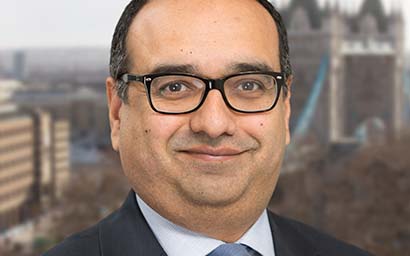 SARBJIT PANESAR, GLOBAL HEAD OF BUSINESS DEVELOPMENT, ASSET MANAGERS, SOCIETE GENERALE SECURITIES SERVICES
SARBJIT PANESAR, GLOBAL HEAD OF BUSINESS DEVELOPMENT, ASSET MANAGERS, SOCIETE GENERALE SECURITIES SERVICES
What ramifications have you seen in the wake of the Woodford fund collapse and the role of the fund administrator?
As seen with the recent issues with Woodford, H2O and the UK open-ended property funds, Ucits fund liquidity is coming into sharp focus. We are seeing regulators across the globe taking an interest on how managers manage liquidity risk and how this risk is disclosed in fund documentation. As a key stakeholder, the administrator plays a key part in providing the reporting to the management company, investment manager and the depositary helping them fulfil their obligations.
Administrators need to focus on:
- Data – ensuring that the reporting is comprehensive, and the data points are up to date. An example being how liquid a particular asset is. A number of factors come into play – including free float, the nominal held and the daily traded volume and not just the market capitalisation.
- Governance – the engagement with all the key stakeholders and having an escalation processes that has the necessary focus from stakeholders.
- Solutions – In case of systemic crisis and under a close monitoring from local regulators, several mechanisms can be put in place such as ‘gates’, swing pricing, side pocket, soft close/hard close, préavis, redemption in kind… Fund administrators like SGSS and other stakeholders are able to help manage these solutions according to their mandate.
In summary, the evolution requested from the administrator is to have a deeper understanding of the different risks of the fund and to have an agreed governance to guarantee resolution or escalation and provide innovative solutions to help asset managers.
Whether through acquisition or organic development, where is the most resource focused at present in the development of your business?
SGSS strategy implemented an in-depth transformation of its organisation around value chains able to deliver solutions to our clients, digital initiatives, data optimisation and partnerships to make the business more productive.
We are:
1. Developing of our service offer on a platform basis:
- By offering solutions that are both highly integrated, allowing customers to benefit from the full outsourcing of value chains while remaining modular in order to adapt to models in open architecture. One of our core products is Crosswise, SGSS front-to-back solution to asset managers and asset owners. We have a multi-year investment program that started in 2017 to enhance and extend the offering leveraging on SimCorp Dimension platform our dealing desk and our digital platform for all other features. The objective is to propose a one-stop shop to our clients.
- By offering unique and digital access to our services and more broadly to those of the entire bank. In order to accompany our clients in an optimised manner and to develop our franchises we are capitalising on SG Markets, Societe Generale wholesale platform. This enables complete digital solutions and provide access to markets, financing, global transaction banking as well as securities services personalised to meet their specific needs. This platform, using more than 200 APIs, provides our development teams shared capabilities which enables to deliver solutions much faster and directly available to clients.
- By integrating partners bringing the power of their specialisation to part of the value chain. For example, with a strategic partnership with SimCorp for the development of the Crosswise platform or with MFEX for global fund distribution.
2. Optimising data
Exploiting data and usage of the latest technologies are at the heart of all our developments, whatever their type. We are in particular capitalising on our data-lake technology, using all opportunities to clean and enrich our data. This will speed developments and facilitate the launch of our future offers. For example, we are implementing solutions based on artificial intelligence to reinvent fund factsheet production from analytics to automated commentaries and personalised layout or with D-View, a dashboard to monitor fund distribution.
3. Reviewing our main production chains
We are reviewing our main production chains to optimise our costs, reduce our operational risks and gain flexibility and efficiency in our services, with ultimately an improvement in the customer experience. In addition, regulatory projects such as CSDR [Central Securities Depositaries Regulation], T2/T2S [Target2/Target2-Securities], Shareholders Directive, Fourth Anti-Money Laundering Directive and other local requirements continue to require significant investments.
In your view, what should be the top one or two operational priorities for fund management firms now, and why?
As we have seen in these unprecedented times, two key operational prerequisites are resilience and a broad business continuity planning. The firms that have been least disrupted by the events over the last number of weeks are the ones that have invested in technology which has brought flexibility. This has allowed them to be adaptable with their staff – location and access. In our view, the operational digitisation is the key priority as it drives efficiency, resiliency and flexibility. In addition, with the increasing SRI [socially responsible investing] demand from investors, asset managers must have the operational tools to address this demand and with the Covid-19 crisis, one can wonder whether new Covid-19 criteria should be included in SRI.
Have you seen any notable shifts in appetite for clients launching product in particular domiciles in the past, say, two years and what were the drivers? Also have you won any new mandates over the past year and where is new business coming from?
The simple answer to this question is no. The drivers for choice for domicile of funds are multi-faceted – from end investor requirements to tax status to regulatory environment. SGSS continues to win mandates across its chosen geographies. The ability to provide both domestic and cross-border fund servicing and the ability to help our clients navigate the complexities of the European funds landscape holds SGSS in good stead in winning mandates.
In the context of Brexit, what are you finding to be the biggest challenges to fund clients (whether UK or European) and how are you helping them?
The biggest challenge has been the uncertainty, which continues to date. We have seen UK managers who have promoted their UK-domiciled funds’ cross-border transition to Luxembourg or Dublin. What we have not seen is the mass launch of UK-domiciled funds by managers who currently distribute their cross-border product into the UK. This has been driven by the FCA’s Temporary Permission Regime (TCR), which will be reopened in 2020.
The impact of the TCR has meant that managers have been able to continue to distribute cross-border funds into the UK. As discussions come to fruition on how trade will occur between the UK and the EU, we may see more a transition from cross-border funds to UK-domiciled funds. SGSS is strategically and operationally positioned to support both domestic and cross-border funds across the European landscape.
Societe Generale Securities Services
Perspective Defense, Bat B,
5 Rue du Débarcadère
Colombes 92700
France
www.securities-services.societegenerale.com/fr/
Country of origin: France
Global number of employees: 4,000
Total AuA: $713 billion
Total AuA in Emea business: $713 billion
Total AuA Ucits in Europe: n/d
Total AuA Non-Ucits in Europe: n/d
Senior executives in Europe: David Abitbol (Paris), head of securities services; Christophe Baurand (Paris), head – coverage, marketing and solutions; Gaëlle Duclos (Paris), head of fund services operations; Mathilde Guérin (Paris), head of transformation and technology delivery
STATE STREET
State Street
20 Churchill Place
Canary Wharf
London E14 5HJ, UK
+44 20 3395 2500
www.statestreet.com
Country of origin: USA
Global number of employees: n/d
Total AuA: $34,358 billion
Total AuA in Emea business: $7,325 billion
Total AuA Ucits in Europe: $1,345 billion
Total AuA Non-Ucits in Europe: $4,015 billion
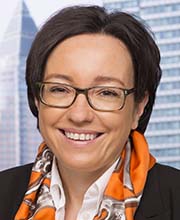 KATJA MÜLLER, CHIEF CUSTOMER OFFICER, UNIVERSAL-INVESTMENT
KATJA MÜLLER, CHIEF CUSTOMER OFFICER, UNIVERSAL-INVESTMENT
Have you made any acquisition in the past two to three years and what were the drivers?
Universal-Investment acquired Lupus Alpha Business Solutions in January 2019. The IT service provider and data specialist complements our service portfolio for asset managers and institutional clients, offering front-office solutions, data warehousing as well as tax and investment reporting.
What ramifications have you seen in the wake of the Woodford fund collapse and the role of the fund administrator?
We have not noticed any ramifications as a direct result. The fundamental approach for fund administrators or ManCos in Luxembourg remains the same: to ensure proper governance, compliance and risk management. This way, not just fund initiators are safeguarded, but ultimately investor protection is ensured.
Whether through acquisition or organic development, where is the most resource focused at present in the development of your business?
Our vision is to become the leading European fund service platform for all asset classes. Most of our resources are directed at growing the different parts of our business organically to reach this goal. The second important cornerstone of our strategy is M&A, which will help us tapping new markets or acquire specialist expertise.
In your view, what should be the top one or two operational priorities for fund management firms now, and why?
We will see an increased impact of emerging technologies in the operations of fund management firms. Robotics, AI, ML and blockchain/distributed ledger technology will improve the client experience and change the value chain in fund management, reduce costs significantly and enable fully scalable processes.
The second focus should be on the increased demand for digital assets and ultimately the creation of fully digital funds. A digital fund can be traded faster, easier and cheaper on the blockchain while reducing entry barriers, enable fully automated processes and make non-fungible assets easier tradeable through tokenisation.
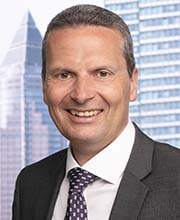 STEPHAN SCHOLL, CHIEF OPERATIONS OFFICER
STEPHAN SCHOLL, CHIEF OPERATIONS OFFICER
Have you seen any notable shifts in appetite for clients launching product in particular domiciles in the past, say, two years and what were the drivers? Also have you won any new mandates over the past year and where is new business coming from?
The trend of institutional clients allocating more assets towards alternative assets continues in 2020. Luxembourg plays a crucial part in this respect as our platform offers the appropriate vehicles. The investors’ motivation remains the same: diversification to improve risk management and higher yields in the current low interest rate environment.
Business is growing according to our expectations. Last year, we managed to increase our AuA by 20% to $571 billion. Our international sales efforts pay off. We won new business with fund initiators across Europe, particularly from the Netherlands, Scandinavia, Switzerland and the UK. The main share still comes from our institutional business in Germany, where we pulled together approximately 30% of this segment’s net inflows in 2019.
In the context of Brexit, what are you finding to be the biggest challenges to fund clients (whether UK or European) and how are you helping them?
Clients affected by Brexit find the whole range of Luxembourg and German AIF and Ucits investment vehicles in our portfolio. We are offering support for European or worldwide distribution with registration services. Universal-Investment’s commission management works with more than 100 partners, making the funds available on most banks and platforms. Already today, we are the largest AIFM and third-party ManCo in Luxembourg.
Universal Investment
Theodor Heuss Allee 70
Frankfurt am Main 60486
Germany
[email protected]
+49 69 710430
www.universal-investment.com
Country of origin: Germany
Global number of employees: 650
Total AuA: $567 billion
Total AuA in Emea business: $567 billion
Total AuA Ucits in Europe: $54 billion
Total AuA Non-Ucits in Europe: $513 billion
Senior executives in Europe: Michael Reinhard (Frankfurt), chief executive officer; Frank Eggloff (Frankfurt) chief financial officer; Katja Müller (Frankfurt), chief customer officer; Stephan Scholl (Frankfurt), chief operations officer.
© 2020 funds europe





